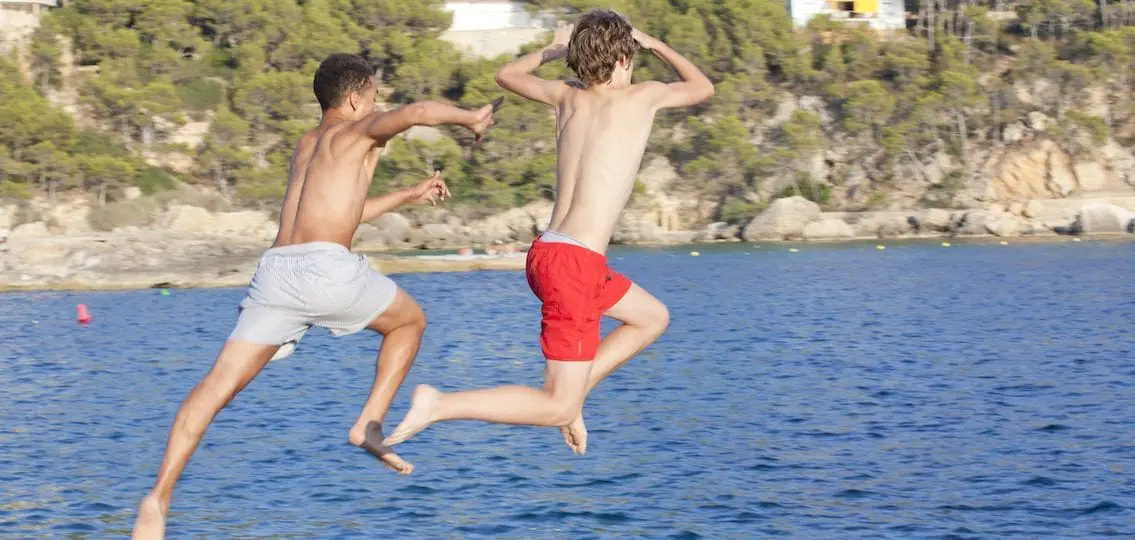It’s a frequent question these days. “What are your kids doing this summer? Are they going to camp?”
When I respond that, yes, in fact, two of my kids are going to camp, the follow-up question is always, “Who are they going with?”

The answer is no one. My kids didn’t sign up with anyone from school. Beginning a decade ago, when my oldest child first ventured into the world of summer camps, we tried to find an option where no one from her class would be attending so she could make friends outside of school.
Shaking Up the Social Order
I’ve noticed that as children move from elementary school into middle school, there is a developmental shake-out of their social groups. Even with the positive impacts of school-wide kindness campaigns, bullying prevention initiatives, and the integration of social and emotional learning, most classes still have their queen bees and kingpins. The most powerful kids enjoy a strong influence over how their classmates treat others.
Time and again, the same social pecking order that emerges at school is recreated at places where groups of classmates attend together — at camps, in school team sports, and in extracurricular activities. This reinforces labels and makes it more difficult for kids to redefine who they are as they grow and change.
Biologically, children evolved with a strong desire to conform to their social groups. In ancient times of hunting and gathering, being rejected by the group was often a matter of life and death, especially as youngsters went through puberty and needed to establish their own social groups. Alas, modern society has changed faster than the teenage brain, and tweens and teens remain much more susceptible to groupthink than adults.
Matt Langdon, founder of The Hero Round Table Conference—a series of international events known as the “Ted Talks of Heroism”—is one of the foremost experts on heroism in the world. He explains that “the pressure to obey in a crowd is one of the strongest barriers to heroic action.”
Adolescents who make decent decisions when they are alone are more likely to join in misbehavior when they are with their peers. This is why we see kids who are willing to abandon their true values in order to go along with the group, whether that takes the more aggressive form of taunting a peer or the fear-based form of staying silent instead of speaking up in the face of mistreatment of others.
The pressure to maintain the status quo is so great that children are afraid to take a risk and draw the attention of the group, even when the stakes are low. Several years ago, I remember taking a group of middle school girls to lunch after a half-day at school. A quick consensus revealed that most of the girls wanted mac and cheese. When it was time to place the order, a girl that I knew well, a child who always preferred spaghetti with marinara, asked for mac and cheese.
“Are you sure that’s what you really want?” I asked her.
She bit her lip and whispered, “No.”
I whispered back, “It’s okay to eat a different lunch than the others.”
She changed her order and thoroughly enjoyed her usual spaghetti. That incident really stuck with me as a reminder of how hard it is for middle schoolers to make independent decisions when they perceive a peer influence.
The way to change groupthink is to teach kids how to practice standing out and being different in ways that feel safe.
For example, a child can practice speaking up in class, taking a different point of view in a discussion, or wearing an item of clothing that is unique. As kids become more comfortable with standing out in a crowd, the thought of going against the grain in a higher stakes social situation is less frightening. One of the best ways for kids to find their individuality is to join multiple tribes where they can express different parts of who they are.
Reinventing Themselves and Making Friends Outside of School
For a child that is socially vulnerable, whether your child tends to be a target, an aggressor, or a follower, escaping the pressures of the established group provides relief and comfort. Going to a different summer program than their classmates allows kids to reinvent themselves and see who they are without the burden of existing peer labels. The sidekick can become a leader. The shy child can find a voice. The perfectionist can make mistakes. The sarcastic class clown can display empathy and sensitivity.
There is great power in making friends outside of school and having multiple tribes. It is not uncommon for even the most well-liked children to have a tough year or two, particularly in middle school. Students may struggle to find a group that welcomes them during the unstructured times, internally agonizing over the gaping abyss of lunch and recess each day. The myth of “everyone else has more friends” is perpetuated by Snapchat and Instagram, a 24-hour barrage of insecurity.
Kids who have multiple tribes outside of school suffer less isolation and loneliness during those hard periods.
True, they may see on social media that peers from school are at a party without them, but they can reach out to have a sleepover with that soccer or basketball or church or camp friend outside of school who is completely removed from their school’s social scene. Tribes can be found anywhere, and each additional tribe strengthens your child’s sense of belonging in this world.
As children identify with different tribes, their sense of empathy grows. A boy who is a member of his school’s football team as well as a member of a community theatre group is more likely to speak up if he sees people at school picking on a non-athletic, artsy classmate. A girl who belongs to her school’s competitive dance team and also leads her Girl Scouts robotics team is less likely to look down on kids who gravitate toward math in lieu of cheerleading.

Summer is an incredible opportunity to make friends outside of school, join new tribes, and forge new identities. If your child can’t find a classmate to join a new camp, that may be the best gift. It frees your child to explore all the different ways to be a person. “Go find your next tribe,” is always a hopeful option, with the knowledge that we can be members of infinite tribes in this world.




